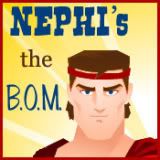Look Around You
From Music and the Spoken Word
Delivered By: Lloyd D. Newell • Program 4330
The story is told of a devout young
man whose car broke down, forcing him to make his way to his place of
worship on foot. As he walked, he passed an area of startling
poverty—where destitute people lined the streets, struggling to keep
warm; troubled and angry individuals wandered the streets. The
depressing scene filled him with a sense of hopelessness.
In his despair, he offered a prayer
to God. In a voice both pleading and questioning, he said, "How can You
allow all this suffering and do nothing?” Then someone behind him
whispered, "He didn’t do nothing. He made you.” At once the young man
realized that he could be God’s hands. He could help a troubled world—or
at least a troubled individual.1
At times it can be easy to relate to
the helplessness this young man felt, because we certainly do live in a
world of turmoil. Society’s problems seem so immense, and we seem so
small. Too often, we conclude that there is nothing we can do—and we
consequently do nothing.
What we need is the gentle reminder
this young man received: that we can be the instruments of constructive
change. As one influential leader put it: "God does notice us, and he
watches over us. But it is usually through another person that he meets
our needs. Therefore, it is vital that we serve each other.”2
We were made with a purpose, and
that purpose is to do something for others, to help and bless those in
need, and thereby to make a difference in the world. Most often it
doesn’t take much—a change of perspective that can lead to a change of
heart, a willingness to accept our part in making things better, a
simple desire to help others and look for the good. That positive energy
and action can truly change the world in the way most real change
happens: one person at a time.
1 See Michael Josephson, "He Made You,” What Will Matter, May 7, 2012, http://whatwillmatter.com/2012/05/commentary-774-2-he-made-you.
2 Teachings of Presidents of the Church: Spencer W. Kimball (2006), 82.











No comments:
Post a Comment